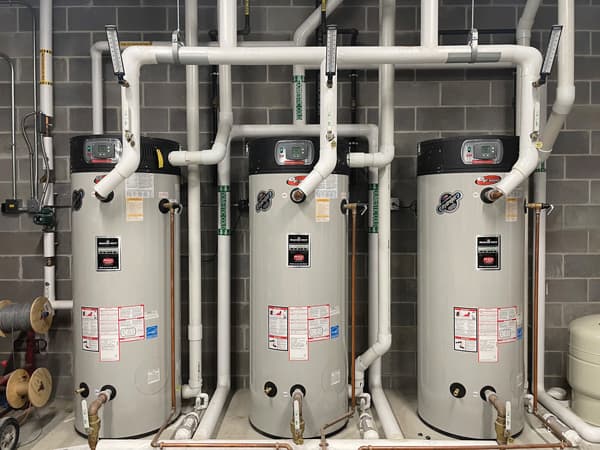By Dustin Bowerman
From the February 2023 issue
TThere is no standard formula for maintenance teams to determine when water heaters should be repaired and when they should be replaced. Life for them and facility managers could be easier if it were, as making the right decision can save time, money and keep operations running. On the other hand, wrong decisions can lead to unexpected equipment failures, which can be a disaster for plant teams.
Regular maintenance ensures a water heater is operating efficiently while reducing energy costs and providing consistent performance. (Photo by Rand Construction)
Prevent device failures
The immediate consequences of equipment failure can include water damage, unplanned downtime, customer inconvenience, and emergency repair and sanitation costs. At worst, damage to reputation, legal fees, and insurance costs can greatly exacerbate the business and financial impact.
A multitude of factors, from the application of the water heater to maintenance and environmental conditions, play a role that make it impossible to establish hard and fast rules. However, many sudden failures can be prevented with routine planned maintenance and periodic repairs when necessary.
Investing in regular maintenance and inspections can have several benefits:
- Maintenance can help water heaters maintain peak performance and last longer.
- Maintenance and regular inspections can reduce the risk of an emergency failure.
- Maintenance is almost always cheaper than unnecessary or unplanned replacement.
Over the life of a system, the costs of adjustment, maintenance, inspection and repair provide measurable savings in operational efficiencies and the premature need for new equipment. Inspections can catch small problems before they become bigger problems, which in turn helps extend equipment life. In addition, regular maintenance helps ensure efficient performance, which can reduce energy costs and ensure consistent product performance. Routine maintenance also helps build trusting, professional relationships between service technicians and plant teams.
equipment life
Maintenance is not a permanent solution. As aging equipment inevitably becomes less efficient, maintenance and repair costs will eventually exceed the replacement price. How can facility managers and maintenance professionals minimize the risk of an emergency water heater replacement? How can they avoid falling costs by trying to service water heaters beyond their lifetime? How can they balance these two concerns to ensure they are making the right decision for the circumstances?
Commercial water heaters are incredibly hard-working machines with capacities ranging from 80-120 gallons and inputs of up to 500,000 BTUs per hour. Industry standard warranties range from three to five years, but actual unit life can vary widely based on local conditions, application and maintenance. It is not uncommon for commercial water heaters to last twice as long as their warranty period, but if not accurately sized, properly maintained, or operated in optimal conditions, product life can be significantly reduced.
If the tank is not leaking, then in many cases it is worth repairing the water heater. If you schedule regular maintenance, use the heater appropriately, and it is within the unit’s reasonably expected lifespan, a modest investment in repairs is usually worth more than the replacement costs involved.
However, always consider the following factors, especially with older heaters or expensive repairs:
 (Photo by Chadds Ford Climate Control)
(Photo by Chadds Ford Climate Control)
- Will it save money in the long run?
- Will a new unit increase efficiency?
- Has the hot water demand changed since the unit was installed?
- Are there new local, state, or federal regulations to consider?
- How often does the heater need to be serviced?
- Will new, more efficient devices reduce energy costs enough to pay for a replacement installation?
Owner’s manuals usually provide a recommended maintenance schedule. By sticking to this schedule, you can do a lot to keep your devices working effectively. It is also worth checking the manufacturer’s recommendations for periodic visual inspection of parts and machines, the integrity of the water tank and calcification of the heat exchanger. In some cases, failure to perform recommended maintenance may void the warranty.
It’s also important to review the application regularly to ensure you’re using the right equipment for the job. In the commercial and facility markets, using the right equipment for the application is key to achieving desired performance and maximizing service life.



Comments are closed.